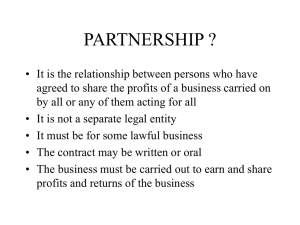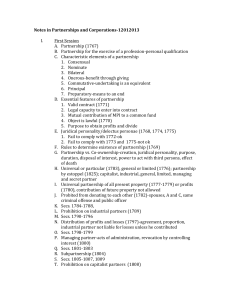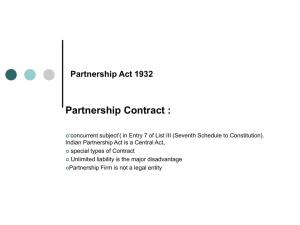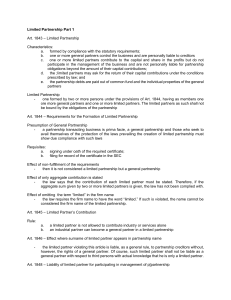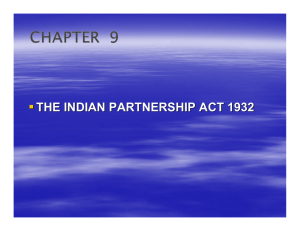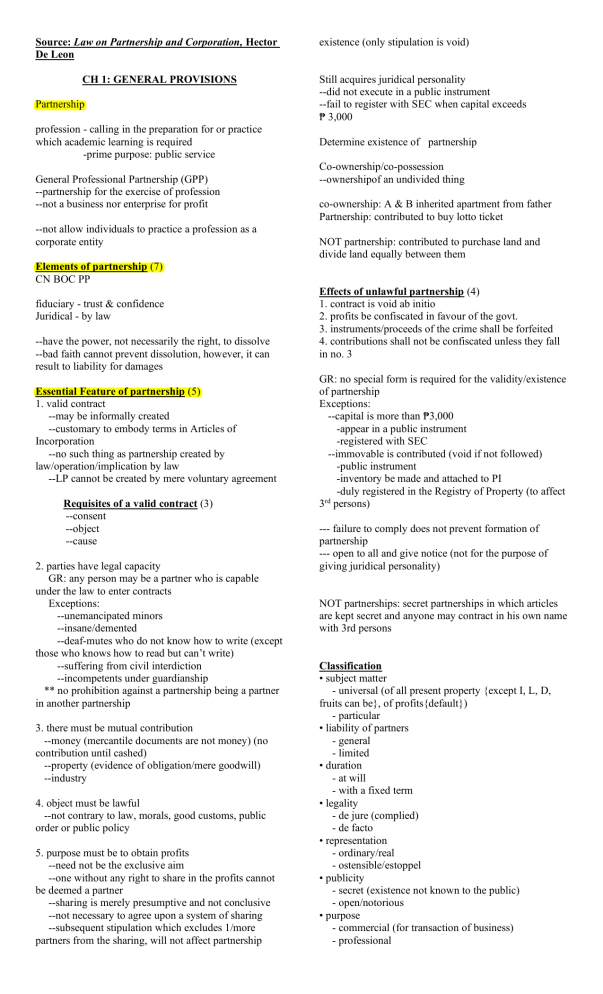
Source: Law on Partnership and Corporation, Hector
De Leon
CH 1: GENERAL PROVISIONS
Partnership
profession - calling in the preparation for or practice
which academic learning is required
-prime purpose: public service
General Professional Partnership (GPP)
--partnership for the exercise of profession
--not a business nor enterprise for profit
--not allow individuals to practice a profession as a
corporate entity
existence (only stipulation is void)
Still acquires juridical personality
--did not execute in a public instrument
--fail to register with SEC when capital exceeds
₱ 3,000
Determine existence of partnership
Co-ownership/co-possession
--ownershipof an undivided thing
co-ownership: A & B inherited apartment from father
Partnership: contributed to buy lotto ticket
NOT partnership: contributed to purchase land and
divide land equally between them
Elements of partnership (7)
CN BOC PP
fiduciary - trust & confidence
Juridical - by law
--have the power, not necessarily the right, to dissolve
--bad faith cannot prevent dissolution, however, it can
result to liability for damages
Essential Feature of partnership (5)
1. valid contract
--may be informally created
--customary to embody terms in Articles of
Incorporation
--no such thing as partnership created by
law/operation/implication by law
--LP cannot be created by mere voluntary agreement
Requisites of a valid contract (3)
--consent
--object
--cause
2. parties have legal capacity
GR: any person may be a partner who is capable
under the law to enter contracts
Exceptions:
--unemancipated minors
--insane/demented
--deaf-mutes who do not know how to write (except
those who knows how to read but can’t write)
--suffering from civil interdiction
--incompetents under guardianship
** no prohibition against a partnership being a partner
in another partnership
3. there must be mutual contribution
--money (mercantile documents are not money) (no
contribution until cashed)
--property (evidence of obligation/mere goodwill)
--industry
4. object must be lawful
--not contrary to law, morals, good customs, public
order or public policy
5. purpose must be to obtain profits
--need not be the exclusive aim
--one without any right to share in the profits cannot
be deemed a partner
--sharing is merely presumptive and not conclusive
--not necessary to agree upon a system of sharing
--subsequent stipulation which excludes 1/more
partners from the sharing, will not affect partnership
Effects of unlawful partnership (4)
1. contract is void ab initio
2. profits be confiscated in favour of the govt.
3. instruments/proceeds of the crime shall be forfeited
4. contributions shall not be confiscated unless they fall
in no. 3
GR: no special form is required for the validity/existence
of partnership
Exceptions:
--capital is more than ₱3,000
-appear in a public instrument
-registered with SEC
--immovable is contributed (void if not followed)
-public instrument
-inventory be made and attached to PI
-duly registered in the Registry of Property (to affect
3rd persons)
--- failure to comply does not prevent formation of
partnership
--- open to all and give notice (not for the purpose of
giving juridical personality)
NOT partnerships: secret partnerships in which articles
are kept secret and anyone may contract in his own name
with 3rd persons
Classification
• subject matter
- universal (of all present property {except I, L, D,
fruits can be}, of profits{default})
- particular
• liability of partners
- general
- limited
• duration
- at will
- with a fixed term
• legality
- de jure (complied)
- de facto
• representation
- ordinary/real
- ostensible/estoppel
• publicity
- secret (existence not known to the public)
- open/notorious
• purpose
- commercial (for transaction of business)
- professional
Kinds of partners
• civil code
--Capitalist
-- Liquidating
--Industrialist
-- Partner by estoppel
--General
--Continuing
--Limited
--Surving
--Managing
--Subpartner
•other
--Ostensible (active, known)
--Secret (active, not known)
--Silent (not active, known) (must give notice when
withdraws)
--Dormant (not active, not known) (may retire w/o
giving notice)
--Original
--Incoming
--Retiring
Universal Partnership of all present property
--contribute all properties which actually belong to them
--become common property (property, profit from
property)
GR: future properties cannot be contributed
Any stipulation including the ff. shall be void:
--inheritance
--legacy
--donation
Except the fruits
Profits from other sources (not from contributed
property) is valid as long as there is stipulation
Universal Partnership of profits
--comprises all that the partners may acquire by their
industry or usufruct (right to enjoy the property of
another with the obligation to preserve its form and
substance)
--partners retain ownership
--what passes are the profits and usufruct
--returned upon dissolution
--not included:
- profits acquired through chance (lottery)
-fruits of property subsequently acquired (can be
when there is stipulation)
--persons prohibited to give donations cannot enter into a
UP
Void donations:
--made between persons guilty of adultery
--made between those found guilty of the same criminal
offense
--made to a public officer by reason of his office
Particular Partnership – purpose of carrying out a
specific purpose
CH 2: OBLIGATIONS OF THE PARTNERS
Sec 1 Obligations of P among themselves
Juridical relations: (4)
P, P-P, P-3rd, P-3rd
Oblig with respect to contributions of property (5)
1.contribute at the beg./stipulated time
2.answer for eviction
3.answer to the partnership for the fruits
4.preserve pending delivery
5. indemnify the partnersgip for any damage
Fails to contribute, liable for interest and damages
Oblig with respect to contribution of money &
conversion for personal use
1. contribute on the due date
2. reimburse
3.pay the agreed/legal interest
4. indemnify
Prohibition against engaging in buisness:
• Industrial - absolute (same kind/any kind)
--engages without sxpress permission,
-CP exclude him from firm
-CP avail benefits
-CP and IP have right to damages
• Capitalist - same kind
GR: CP not bound to contribute more than what he
agreed to contribute
Exceptions:
- imminent loss
- majority CP, addtl would save
- CP refuses
- no agreement
*IP is exempted from additional contribution
Debtor pays to MP in MP's name
- applied to personal and partnership credits
Debtor pays to MP for partnership account
- applied wholly to partnership credit
Requisites:
- 2 debts (collecting partner, partnership)
- both are demandable
- one who collects is authorized to manage
GR: damages caused by a partner to the partnership
cannot be offset by the profits which he may have earned
Exception:
--unusual profits are realized through extraordinary
efforts of partner in fault (courts may lessen liability)
Risk of loss of things contributed:
(delivered to the partnership)
(1) S, D, not F, usufruct contributed = partner
(2) S, D, ownership to Partnership = partnership
(3) F (only for use) = partnership
(4) to be sold = partnership
(5) brought and appraised in the inventory =
partnership
Fungible things – goods of which any unit is treated as
equivalent of any other unit
CP - prohibited: same line (may be stipulated to be
allowed)
Partnership obligation to partners:
- refund advances made by partners
- answer for obligations contracted in good faith
- answer for risks
Distribution of profits
1. agreement
2. n/a: -- CP, proportion to CC
-- IP, first, just and equitable (also shares in the
profit after giving to IP if he has CC)
Distribution of losses
1. agreement
2. n/a: -- profit-sharing ratio (except IP)
3. no p-s ratio: proportion to CC (except purely IP)
May assign 3rd person for the designation of share in
P/L (by common consent)
--impugne when manifestly inequitable
--cannot complain:
- begun to execute decision
- fails to impugn within 3 months
Exclusion from losses:
-express stipulation: no partnership
-excludes IP: valid stipulation
GR: not entitled to formal account
Exceptions:
- wrongfully excluded from partnership
Sec 2 Property Rights of a Partner
Principal Rights (3)
PP, I, M
Related Rights (5)
- reimbursement
- access & inspection of books
- true & full info
- formal account
- partnership dissolved
Partner acquired in own name using partnership funds =
partnership property
Partner acquired in own name using partnership funds
after dissolution, before winding up = own property
(liable to the partnership for the funds used)
Carried in the partnership books = partnership property
Income generated by property is received by partnership/
taxes paid by partnership = partnership property
Appointment of MP in the articles:
- revocable: - just and lawful cause
- vote of partners representing
controlling interest
Appointment of MP after constitution of the partnership:
- revocable: - any time, any cause
- vote of CI
2/more MP:
-- duties unspecified
• oppose: -decision of majority of MP
- tie: CI partners
-- specified
• decision of partner concerned
Requisites:
- 2/more MP
- unspecified
- no stipulation that 1 shall not act w/o consent of all the
others
Stipulated that consent of all MP is required
- exception: -- imminent danger to the partnership
-- routine transactions
No manner of management
• opposition: -- majority vote of MP
-- tie: CI of all partners
Alteration of immovable
- unanimous consent of all partners
- need not be express
Except: alteration is necessary for its preservation, not
merely useful
Subpartner (assignee) - w/o consent
To be a partner - w/ consent of all
Partnership funds used to repair property of partner
bought by own funds = partner
Incidents of co-ownership:
- equal right of possession
- cannot assign his right (except retiring)
- not subject to attachment/execution except on a claim
against the partnership (interest is)
- not subject to legal support (interest is subject)
Partner's interest:
- profit (net income)
- surplus (assets-liabilities/equity)
Rights withheld from assignee:
- management
- require any info
- inspect books
Rights of assignee
- receive profits
- usual remedies in the event of fraud
- receive interest upon dissolution
- require an account of partnership affairs upon
dissolution
(purchaser of interest may apply to the court for the
dissolution)
Sec 3 Obligation with regard to 3rd Persons
Firm name
- facilitate business transactions
- must be registered with the Bureau of Commerce (not
DTI)
- may be that of an individual partners, surnames with
the addition of "and Company"
- cannot continue to use in its firm name the names of
deceased partners
- the continued use of the name of a deceased partner is
permissible provided that the firm indicates in all its
communications that said partner is deceased
Persons who, not partners, include their names in the
firm name
- do not acquire the rights of a partner
- subject to the liability of a partner insofar as 3rd
persons w/o notice are concerned
GR: partner has the right to make all partners liable for
contracts he makes in the name and for the account of
the partnership
Personally liable: partner may assume a separate
undertaking in his name with a 3rd party
Partners, including IP, are liable to creditors for the
obligations contracted in the name and for the account of
the partnership
Pro-rata - equally/jointly (cannot increase the liability of
other partners)
Subsidiary - become personally liable only after all the
partnership assets have been exhausted
*acts in contravention of a restriction
-not liable to 3rd persons having actual/presumptive
knowledge of the restrictions, whether or not the acts are
for the usual way of business
-persons not having such notice have right to assume
that authority is co-extensive with the business
-always presumed when there is no evidence
GR: partner who undertakes to bind his co-partners
without authority is personally liable
Real Properties
1. Title: partnership conveyance: partnership
-passes title
-unless: --not in the usual way
--3rd person had knowledge on lack of
authority
--recovery of property & ownership
-cannot be recovered when conveyed to a holder for
value and without notice
2. Title: partnership conveyance: partner’s name
-passes equitable interest only (EI: not duly recognized
by law but in equity alone; right/interest in property
which is imperfect and unenforceable by law)
IP can recover the amount he paid from CP
The inability of the partnership to pay a debt to 3rd party
does not mean that partnership operated at a loss.
The exemption of IP to pay losses relates exclusively to
the settlement of partnership affairs among the partners
themselves
A stipulation among partners contrary to the pro rata and
subsidiary liability shall be VOID
-valid and enforceable only as among partners
Except when authorized, no authority to:
1.Assign PP in trust for creditors
2.Dispose of the goodwill
3.Do any other act that would make it impossible to
carry on the ordinary business
4.Confess a judgement
5.Enter into a compromise concerning partnership
liability
6.Submit a partnership claim to arbitration
7.Renounce a claim
Agreement is silent, each partner has the implied
authority to do all things necessary to carry out ordinary
business
Apparent authority – based on doctrine of estoppels
Third persons – doctrine of mutual agency
-right to assume that every GP has the power to bind the
partnership
-not bound to ascertain acting partner’s authority;
knowledge is enough
-gen. presumption: each partner is an agent and has
authority to bind the firm
-should not assume that a partner has unlimited authority
--when 3rd party deals with a partner with no authority,
partnership is not liable unless the other partners ratify
his acts/are stopped
*carrying on the usual way of business
-2 requisites in order to make partnership liable:
--partner has no authority
--3rd person knows he have no authority
*acts of strict dominion/ownership
-not on the usual way, partnership is not bound, unless
--authorized by all other P
--abandoned the business
3. Title: 1/more partners conveyance: partner
- passes title
-unless: -- not in the usual way
--3rd person had knowledge on lack of
authority
4. Title:1/more for a trust conveyance: partner’s name
-passes equitable interest only
-unless: ---- not in the usual way
--3rd person had knowledge on lack of
authority
5. Title: all partners
conveyance: all partners
- passes title
-cannot be recovered by the partnership
GR: a person is not bound by the act of another of which
he has no knowledge or to which he has not given his
consent, except:
--by virtue of a particular relationship between them
Declaration made by partner acting for the partnership
-admissible
-not admissible: made by a partner who is no longer a
partner
Declaration made in the presence of a partner
-admissible
--notice/knowledge of any partner of any matter relating
to partnership affairs operates as notice/knowledge of the
partnership
--3rd person desiring to give notice need not
communicate with all the partners
3 cases of knowledge:
1.Knowledge of acting partner (AP) while a partner
2.Knowledge of AP then present to his mind
3.Knowledge of any other partner who reasonably could
and should have communicated it to the AP
Liability arising from partner’s wrongful act/omission
-solidary
Requisite for liability:
1.partner must be guilty of a wrongful act
2.acting in the ordinary course of business/with authority
Loss:
-partner acting within the scope of his authority receives
money/property of a 3rd person and misapplies it
-partnership receives money/property of a 3rd person and
the money/property is misapplied by any partner while it
is the custody of partnership
--dissolution must not be understood as its
extinguishment
--no new partnership should be undertaken
--affairs should be liquidated and distributed
--partnership continues until the winding up is
completed
--not the actual cessation
Estoppel – precludes a person from denying/asserting
anything in contrary to that which has been established
as the truth by his own deed, either express/implied
--directly represents himself as a partner
--indirectly represents himself by consenting to another
representing him as partner
Statutory causes of dissolution
1. Without violation of the agreement
-termination of the definite term
-express will of any
-express will of all
-expulsion of any
Partnership liability
-all the actual partners consented
2. Voluntary: will of any partner
Liability pro-rata
-no existing partnership
-all those represented consented
-or not all partners of an existing partnership consented
Liability separate (represented,consented)
-no existing partnership
-not all but some of those represented consented
- none of the partners in existing partnership consented
--liability is created only in favour of persons who gave
credit to the actual/apparent partnership
Incoming partner
-liable for all obligations existing at the time of
admission (limited to his share)
-obligations subsequent to his admission (liable up to
his/her separate properties)
Existing and subsequent creditors
-against partnership property and
-separate property of previously existing partners
Subsequent creditors
-partnership property and
-separate property of existing and newly admitted
partner
Partnership creditors
-entitled to priority of payment
Personal creditors
-may ask for the attachment and public sale of the share
of the partner in the partnership assets
Involuntary: operation of law
-any event which makes in unlawful for the business
to continue
-specific thing perishes before delivery
-death of any partner
-insolvency of any partner
-civil interdiction of any partner
-decree of court
3. Extrajudicially
-without violation
-in contravention of agreement
- any event which makes in unlawful for the business
to continue
-specific thing perishes before delivery
-death of any partner
-insolvency of any partner
-civil interdiction of any partner
Judicially
--application by a partner
-declared insane
-becomes incapable of performing his part
-guilty of such conduct
-willfully/persistently commits a breach of
partnership agreement
-business can only be carried on at a loss
-other circumstances render a dissolution equitable
(abandonment of business, fraud in the management,
refusal to render accounting of partnership affairs
without justifiable cause)
--application by a purchaser of partner’s interes
-termination of a specific term
-any time if partnership was a partnership at will
when the interest was assigned
4. Automatic dissolution
---purchaser in a public sale does not become a partner
--expiration of the term, partners continue without
making a new agreement (partnership at will)
--each partner have the power and right to terminate
without the consent of his co-partners
--dissolve before the termination of term, must be
unanimous
CH 3: DISSOLUTION AND WINDING UP
Dissolution – change in the relation of the partners/any
partner ceasing to be associated
--represents demise of a partnership
Doctrine of delectus personae – have the power to
dissolve the partnership
--withdrawing partner is liable for damages for
unjustified dissolution
Winding up – settling the business
Termination – completely wound up and finally settled
--signifies end of partnership
Specific things
• Loss before delivery
-partnership is dissolved
•
•
Loss after delivery
-not dissolved
-assumes the loss
Loss where only use/enjoyment contributed
-dissolves the partnership
-partner bears the loss
--agreement may provide that death, withdrawal or
admission of new partner will not effect dissolution
--in such a case, estate of deceased is not liable for
obligations after dissolution beyond the extent of his
capital remaining in the business
Insolvency of partner
-subjects his interest in the partnership to the right of his
creditors
-no authority to act for the partnership nor the other
partners act for him
Insolvency of partnership
-partnership property is liable for the satisfaction of
partnership obligations
Civil Interdiction – deprives the offender during the time
of hi sentence of the right to manage his property and
dispose of such property
Dissolution, partner’s power of representation is
confined only to acts incident to winding up/completing
transactions begun but not completed
--terminates the actual authority of a partner to undertake
new business
--partnership is bound by the new contract (innocent
parties can always recover from AP)
Authority of a partner is not terminated:
1.cause of the dissolution is the ac of the partner and AP
had knowledge of the dissolution
2.cause of the dissolution is the death/insolvency of a
partner and AP had knowledge/notice
Knowledge of a fact – actual knowledge
--have knowledge of such other
facts as in the circumstances show bad faith
Notice of a fact – states the fact
--delivers through mail a written
statement of the fact
Power of partner to bind dissolved partnership:
1.act for winding up/completing unfinished transactions
2.any transaction which would bind partnership if
dissolution had not taken place
*extended credit to the partnership prior to
dissolution (had no knowledge/notice)
-notice must be actual (mere mailing is insufficient)
*known of the partnership prior to dissolution and
the fact of dissolution had not been advertised (had no
knowledge/notice)
Partnership not bound after dissolution
1.dissolved because it is unlawful
2.partner has become insolvent
3.partner had no authority to wind up affairs; except by a
transaction with one who:
--extended credit to the partnership prior to
dissolution (had no knowledge/notice)
--known of the partnership prior to dissolution and
the fact of dissolution had not been advertised (had no
knowledge/notice)
Between themselves
-power of agency is terminated
To relieve partnership from liability:
*prior dealers – extended credit through confidence in
the solvency and probity of the firm (dealing on a cash
basis/purchases goods is NOT a prior dealer)
-notice must be actual (mere mailing is insufficient)
*as to all others (who knew of the partnership before)
-notice through advertisement in a local newspaper
-actual notification is not necessary
--dormant partner (unknown & inactive) need not give
notice
--dissolution does not discharge the existing liability of
a partner
--relived only by an agreement between himself,
partnership creditor and other partners (consent of
creditor and partners may be implied)
--individual property of deceased partner shall be liable
for all partnership obligations incurred when he was a
partner
--individual creditors are preferred with respect to
individual property
Manner of winding up:
Judicially – under control and direction of proper court
Extrajudicially – partners themselves
Authorized to wind up:
-partners designated
-absence of agreement, all partners who have not
wrongfully dissolved the partnership
-legal representative of last surviving partner, not
insolvent
--surviving partners are charged with winding up
--estate of the decease is not liable for subsequent
debts/losses of the surviving partners without the
consent of the state
Rights where dissolution is without violation
-have partnership property (PP) applied to discharge
partnership liabilities
-to have surplus owing to partners
*bona fide expulsion of a partner: expelled partner
may be discharged from all PL (receive only cash)
Rights where dissolution is in violation
* not caused dissolution
- have PP applied to discharge partnership liabilities
and receive in cash for the share in surplus
-indemnified for damages
-continue the business
-posses PP if they continue
* wrongfully caused dissolution
--business not continued
- have PP applied to discharge partnership liabilities
and receive in cash for the share in surplus less damages
--business is continued
-ascertain value of his interest and paid in
cash/secured by bond approved by the court
-released from all existing and future liabilities
Voidable/annulable
-induced by fraud/misrepresentation to become a partner
-if annulled, injured is entitled to restitution
-until annulled, partnership relations exists
LP – limited liability is the key characteristic of limited
partnership
-same type of liability as a stockholder of corporation
--no prohibition to engage in business for himself
Rights of injured partner where contract rescinded on the
ground of fraud/misrepresentation:
-right of a lien on the surplus of PP after PL
-right to subrogation after payment of PL
-right of indemnification by the guilty partner
General Partner
personal
No agreement,
equal right
Money, property,
industry
✓
Limited Partner
Up to CC
None
Assignee does
not become a
partner
Freely assignable
with assignee
acquiring all
rights
x
Order of application of assets
1.partnnership creditors
2.loan/advances of partners t the partnership
3.return of capital
4.share of the profits
Assets are insufficient
-deficit is a capital loss which requires contribution
-have the right to enforce contribution
-if partners does not pay his share of the loss, remaining
partners can sue him/her or indemnification
Liability of deceased partner’s individual property (IP):
-liable for his share of the contributions
Distribution of insolvent person’s IP:
1.separate creditors
2.partnership creditors
3.owing to partners
Rights of creditors (old & new) to PP
--dissolved by a change in membership (6)
--business is continued
--without liquidation
-liability of new partner to the creditors of the dissolved
partnership shall be satisfied out of PP only unless there
is a stipulation
Rights of retiring/legal representative of deceased
partner when business is continued without settlement:
-ascertain the value of his interest at date of dissolution
(retirement/death)
-receive an amount equal to the value of his share with
interest
GR: when partnership is dissolved, partner/legal
representative is entitled to the payment of what may be
due after a liquidation
-no liquidation is necessary when there is already an
agreement as to what he shall receive
Liability
Management
Contribution
Party to
proceedings
Assignment of
interest
Use of name in
firm name
Engaging in
business
Causes of
dissolution
Creation
Composition
Operation
✓
Cash, property
x
Prohibited from
all kinds of
business
Retirement,
death,
insolvency,
insanity
No prohibition
General
Partnership
In any form
Only GP
Limited
Partnershi
After compliance
GP and LP
Firm name
followed by the
word “Limited”
Dissolution and
winding up
Statutory requirements:
1.certificate/articles must be signed and sworn to
2.such certificate must be filed for record on the Office
of the SEC
--to give actual/constructive notice to potential
creditors of the limited liability
--strict compliance is not necessary
*partnership transacting business is prima facie a general
partnership
--avail protection under LP, must show due compliance
with statutory requirements
--failure of LP to extend its term when it expired, and to
register it anew with SEC (law considers it as GP)
CH 4: LIMITED PARTNERSIP
Limited Partnership – composed of 1/more general
partners (GP) and 1/more limited partners (LP)
Characteristics
1.compliance with statutory requirements
2.1/more GP control the business and personally liable
3.1.more LP contribute to the capital and share in the
profits but do not participate in the management and are
not personally liable beyond their capital contribution
4.LP may ask for the return of their capital contribution
(CC)
5.PL are paid out of common fund and IP of GP
--if LP contributes services, shall be considered an
industrial and general partner
--a partner may be a GP and LP in the same partnership
at the same time provided it is stated in the certificate
--LP may not be an industrial partner without being a GP
Surname of a LP shall not appear in partnership name
unless:
--also a surname of GP
--prior when LP became such, business had been carried
on under such name
---a LP whose surname appears in the firm name is liable
as GP (without the rights of GP)to partnership creditors
who extended credit without actual knowledge that he is
not a GP
Allowable transactions of LP
-granting loans to the partnership
-transacting other business with it
-receiving a pro rata share of PA with general creditors
Liability for false statement in certificate
--knew false statement at the time he signed, or,
having sufficient time to cancel/amend, fails to do so
--person seeking to enforce liability has relied upon
false statement
--person suffered a loss as a result of reliance
---LP is liable as GP if he becomes involved in the
management of the firm’s business (active participation)
--bare grant of apparent control is not sufficient to make
him liable as GP where he has not actually participated
--not participating: always in the GM’s office and gives
advice
--additional partners may be admitted after formation
--law requires that there is proper amendment to the
certificate which must be signed and sworn to and filed
in SEC
GP have no authority to (acts of strict dominion):
1.do any act in contravention
2.do any act which would make it impossible to carry on
the ordinary business
3.confess a judgement against partnership
4.possess PP, assign their rights
5.admit a person as GP
6.admit a person as LP, unless the right is in the
certificate
7.continue the partnership with PP on the death,
retirement, insanity, civil interdiction or insolvency of
GP, unless the right is in the certificate
Other limitations:
--no power to bind LP beyond the latter’s investment
--change the nature of the business without consent of
the LP
Same rights of LP as to GP:
1.have partnership books kept at principal place of
business
2.have on demand true and full info of all things
affecting partnership, and a formal account of
partnership affairs
3.have dissolution and winding up by decree of court
Specific rights of LP:
1.require that partnership books kept at principal place of
business
2.inspect & copy PB at reasonable hour
3. demand true and full info
4.demand formal account of partnership affairs
5. ask for dissolution and winding up by decree of court
6.receive a share of profits by way of income
7.receive the return of his contribution (PA > PL)
Exemption from liability as GP
-contributed capital
-believing that he has become a LP
-name appears on the certificate as GP
--he promptly renounces his interest in the profits (sell to
GP) (renounce his interest before partnership has
become liable to 3rd persons)
--surname does not appear in the partnership name
--does not participate in the management
Prohibited transactions of LP
-holding as collateral security any PP
-receiving any payment if PA are not sufficient to
discharge PL
*preference may be given to some LP as to the:
-return of their contribution
-compensation by way of income
-any other matter
LP shall not receive until:
1.All assets have been paid (except those owed to GP
and LP on account for their contribution: return of
contributions, loan extended, indemnity)
2.consent of all (GP & LP) have been obtained
3.certificate is cancelled/amended as to set forth the
withdrawal/reduction in the contribution
LP may rightfully demand the return of his contribution:
1.on the dissolution
2.date specified in the certificate has arrived
3.after he has given 6 months notice in writing to all
other members , if no time is specified
LP have right to demand and receive cash, except:
-stipulated
-all partners (GP and LP) consents to the return other
than cash
LP may have partnership dissolved when:
1.rightfully but unsuccessfully demands the return of his
contribution
2.PP is insufficient for the payment and the LP is
entitled to the return of his contribution
LP is liable to the partnership:
--difference between his contribution as actually made
and that stated in the certificate
--unpaid contribution which he agreed in the certificate
to make in the future
--LP’s liability is to the partnership, not creditors
--GP cannot waive any liability to the prejudice of
creditors
Liability as trustee
--specific property not contributed
-- specific property which has been wrongfully returned
to him
--money wrongfully paid to him
--other property wrongfully paid to im
Liabilities of LP may be waived:
--waiver is made with the consent of all the partners
--waiver does not prejudice partnership creditors
assignee
-- is only entitled to receive the share of the profits by
way of income/return of contribution
--no right to require any info/account of partnership
affairs
--acquires all the rights of LP only when he becomes a
substituted LP
Requisites to become substituted LP:
-all the members must consent or
LP must give the assignee the right to become LP
-certificate must be amended
-certificate must be registered in SEC
Substituted LP: liable for all liabilities of assignor
Assignee: not released from liability to persons who
suffered damage by reliance on false statement and to
creditors who extended credit before substitution
Change in the relation of limited partners
-does not necessarily dissolve
Change in the relation of general partners
-dissolves the partnership unless
---agreed upon at the beginning
---agreed after the time
On the death of LP:
-executor/administrator shall acquire all the rights of LP
for the purpose of settling the affairs of LP
Creditor of LP:
-apply to the proper court for an order charging the LP’s
interest in the partnership for the payment of any
unsatisfied claim
---the interest charged may be redeemed with the
separate property of any GP but not PP
---redeemed with PP with the consent of all partners
whose interest is not so charged
Priority in the distribution of assets after dissolution:
1. due to creditors (including LP loans extended)
2. LP in their share of profit
3. LP for the return of capital
4. GP for their advances/loans
5. GP in respect to profits
6. GP for the return of their capital
General partnership: claims of GP in respect to capital
enjoy preference over in respect to profits
ART 1864. Certificate shall be amended
Certificate shall be cancelled:
--dissolved other than by expiration of term
--all LP ceases to be such
** in writing, signed by all and filed with SEC
---approval by the Commission of the
amendment/cancellation is not required
LP – no right of action against 3rd persons
LP a proper party:
--the object of the proceeding is to enforce his individual
rights against the partnership and to recover damages for
violation of such right
--action by law against LP to account for and restore
sums withdrawn by him from the capital of the firm with
outstanding debts on a voluntary dissolution
